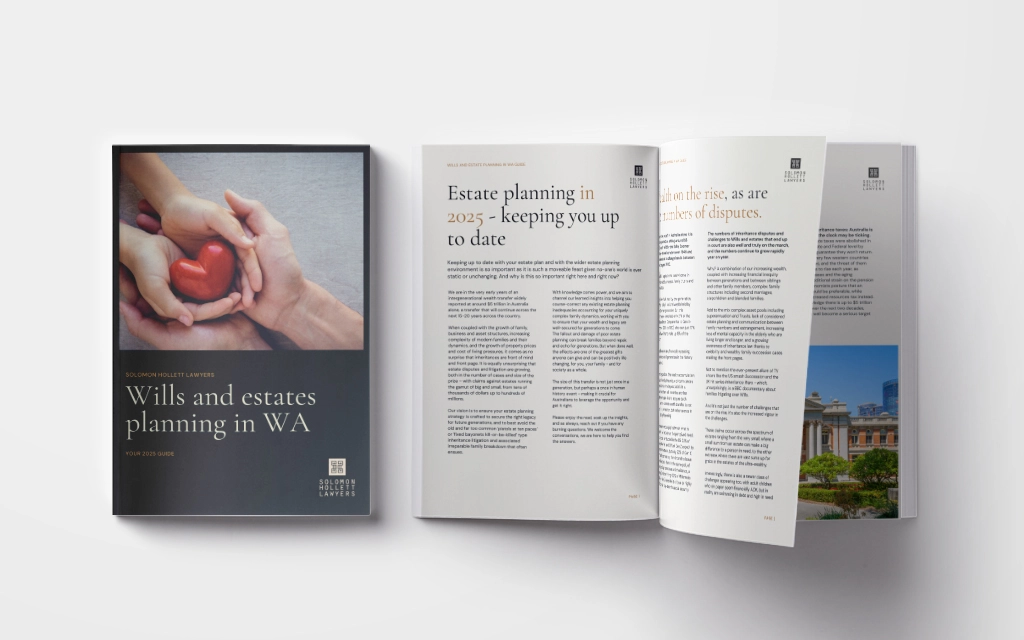
ENDURING POWER OF ATTORNEY LAWYERS
Enduring Power of
Attorney
You may one day be unable to manage your own financial or property affairs. A legally binding Enduring Power of Attorney lets someone you trust step in without court or tribunal delays.
Our estate planning lawyers can draft, advise, and defend these documents to protect your interests, today and later.
Book your first consultation todayThe Law
Australasia
Pursuit of
Excellence Award
Doyle’s guide
award
2025 | 2024 | 2023
2022 | 2021 | 2020
The Law
Australasia
Pursuit of
Excellence Award
Doyle’s guide
award
2025 | 2024 | 2023
2022 | 2021 | 2020

How we help you with your Enduring Power of Attorney

When you meet with our estate planning solicitors, you’ll have the chance to talk openly about your personal circumstances — who or what you’re looking to protect, and the outcomes that matter most to you. From there, we’ll give you clear, tailored advice on the best course of action.
We can guide you through:
- When to have an Enduring Power of Attorney in place
- Who to appoint and the key considerations when choosing an attorney
- The difference between a general Power of Attorney and an Enduring Power of Attorney
- What an Enduring Power of Attorney covers and what it doesn’t
- What to do if you suspect the power is being misused
- The risks, limitations, and traps to be aware of, and how to avoid them

The legal significance of an Enduring Power of Attorney
An Enduring Power of Attorney is a powerful legal document that allows you to appoint someone to act on your behalf in financial and legal matters. Once in place, it authorises your chosen attorney—the person or persons you’ve named—to manage your bank accounts, property, and other assets as if they were you. It is a practical way to protect your interests if you become unable to manage your affairs.
Because it grants significant authority, it’s critical to get it right. If the wrong person is appointed or the legal document isn’t properly drafted, the consequences can be serious. Our estate planning lawyers guide you through every decision, helping you choose the right person, understand the risks, and ensure the document meets all formal legal requirements in Western Australia.
It’s also important to know what an Enduring Power of Attorney doesn’t cover. It does not allow the attorney to make medical, lifestyle, or personal decisions. For that, you’ll need separate documents—an Enduring Power of Guardianship and an Advance Health Directive. We can assist you with preparing all of these, so that your future is properly protected on every front.
Whether you need to put an Enduring Power of Attorney in place for yourself or someone else, or you’re concerned about how an existing one is being used, we can help. Timing is often critical, particularly where someone’s mental capacity is declining. If you suspect a misuse of power, or you need legal advice on how to act in someone’s best interests, don’t delay in getting advice from our experienced team.
Hear from our team on what is an Enduring
Power of Attorney and how we can help



Need advice on an Enduring Power of Attorney? We’re just a phone call away
Our estate planning solicitors are here to help you put the right protections in place. Book your appointment today to make confident decisions about who can act for you, when it matters most.


Over 130 5-star reviews
From individuals to families, from startups to large corporates, professional groups to charitable foundations – we’ve stood beside a diverse range of clients helping them best navigate their legal journeys. Here’s what just some of them have to say
“I cannot thank Matthew and Morgan enough for their dedication and support during one of the hardest times of my life. From the very beginning, they were not only incredibly knowledgeable and strategic, but also deeply moral, always upholding integrity while achieving outstanding results. I always felt heard, supported, and confident in their guidance. Their trustworthiness gave me peace of mind, and they were always available when I had questions or concerns. If you need a lawyer who truly cares and fights for you, I highly recommend Solomon Hollett Lawyers.”
Client wishes to remain anonymous
“I cannot recommend Solomon Hollett Lawyers enough. The team were fantastic from start to finish. My elderly mother recently lost my father and there were some delicate matters to finalise. From receptionists to the Partners, my mother was treated with respect, kindness, understanding and given every assistance and courtesy she could want. We were informed every step of the process and they made it 100% stress free. Their fees were more than reasonable, especially as my mother is a pensioner. If you are looking for a firm that truly cares, that you can trust to do what you require, when you require it and within budget look no further than the team at Solomon Hollett Lawyers, they’re fantastic!”
Sheryl
“The last few months have caused a significant amount of stress for me around an estate matter. I wasn’t sure what to expect when I searched for legal assistance since I have never had to use the services of a law firm before. Other Google reviews led me to Solomon Hollett Lawyers where I found Brandon to be very helpful and knowledgeable. Just knowing that he was supporting me in this matter made all the difference and helped to facilitate a positive outcome.”
Vicki
“From our first interaction, I knew Andrew Bower was the right lawyer for my property dispute case. His extensive knowledge and clear communication transformed what seemed like a complex issue into something manageable and understandable, giving me the confidence to move forward. Throughout the entire process, Andrew was consistently diligent, attentive, respectful, and compassionate. I always felt heard and supported every step of the way. He made time to address my concerns and provided reassurance that greatly eased my mind. Not only did he handle the legal complexities with professionalism, but he also alleviated the emotional stress that came with it. Andrew was a true blessing in my corner, fighting for me with unwavering dedication. The favourable outcome was a direct result of his expertise and commitment. I truly believe that not all lawyers are created equal—Andrew stands head and shoulders above the rest. His blend of legal brilliance, compassion, and relentless dedication makes him an exceptional lawyer. I’m beyond grateful for his service and support, and I would wholeheartedly recommend him without any hesitation.”
Thao
“Great experience dealing with the team from Solomon Hollett hired to represent me in a contested estate Will in which I was the executor. Best described as down to earth interactions with good comms and professionalism maintained throughout, a positive result was achieved and I have no hesitation in recommending the team.”
Thomas
“Almost two years after winding up my business I received an erroneous letter of demand for close to $200k from a Global supplier which came with a lien on my home. I engaged Andrew from Solomon Hollett based on a recommendation and from the outset I have been nothing but impressed. The communication from Andrew and his team has been prompt and concise. Unfazed by the unlimited resources and size of the plaintiff Andrew was able to negotiate a settlement of less than 5% and obviously have the lien on my home removed. Should you find yourself in need of legal services I have no hesitation in recommending Andrew and his team.”
David
“I have engaged the legal services of Solomon Hollett on a couple of occasions. They have always been professional and have obtained the best outcome possible in every situation. They also treat each matter with care and consideration for their clients. I can highly recommend them.”
Heather
“We had a great experience with Brandon from Solomon Hollett. From the first phone call, I could tell that he had a solid grasp of our situation and what we wanted to achieve. He was very helpful and very responsive throughout our dealings with him. He got everything done in a timely way and we’re very happy with the result. Definitely recommended! Thanks, Brandon :)”
AJ
“We are very grateful to Craig for his outstanding work. Craig was highly professional, clear about his role and what he could do for us and he handled our case with an incisive precision. Craig fully and respectfully explained the processes and complexities of the case in a language that made sense to us, and he outlined in detail steps that we had to take. What impressed us most was his willingness to understand the complexities of our Church structures and laws and take on board our principles and concerns. We cannot recommend Craig highly enough.”
Jaine
“Matthew Gunn was highly recommended to my wife and I. We both needed to renew our old out-dated Wills. We found Matthew to offer very good advice, he also is a good listener and once he gathered the details and our wishes he then gave valuable legal suggestions to ensure we had new Wills that suited our complex needs. Our new detailed legal Wills are exactly the way we wanted it. We can now rest easy knowing that should something happen to one or both of us, our Wills will ensure our investments and wishes are managed the way we requested. If you need legal advice or Wills drawn up, I would recommend you make an appointment to see Matthew Gunn.”
Paul
“I had an exceptional experience with Solomon Hollett Lawyers, particularly thanks to Annabel and Brandon. Annabel was my primary contact throughout my family provisions claim, and her professionalism and honesty made a significant difference. She was always open and transparent, ensuring I understood each step of the process. Brandon, as the director, provided valuable insights and guidance that further reinforced my trust in their team. Both of them set realistic expectations, which helped me navigate a challenging situation with confidence. I truly felt supported and informed every step of the way. I highly recommend Solomon Hollett Lawyers for anyone needing expert legal assistance!”
Alanah and Jarrad
“We engaged Solomon Hollett to represent us (executors) in a challenging and frustrating estate matter. We cannot praise both Morgan Solomon and Matthew Gunn highly enough for the extremely professional and understanding approach they took and their attention to detail. Their knowledge of both the law and estate procedures was second to none and their communication skills were outstanding. We settled the matter at mediation thanks in large part to their support and guidance. I would very strongly recommend them.”
Ian and Alan
“Many thanks to Brandon Hetherington who helped us with a recent property transaction matter and achieved a favourable outcome. Brandon was referred to us by an interstate law firm as a matter of urgency. We were and are immensely grateful that he was exceptionally professional, efficient, knowledgeable, informative, experienced, responsive and respectful in assisting us. His advice gave us extra confidence in dealing with the matter and we were fully satisfied with the results. We cannot thank Brandon enough. We give 10 out of 5 stars for Brandon, and highly recommend his services and Solomon Hollett Lawyers.”
LF
“Morgan is absolutely outstanding. Thorough, considerate and clearly communicates, but also works with compassion. He was so reassuring and helpful we couldn’t believe that treatment from a lawyer. Cannot speak highly enough of him and the work they do.”
Kristen
“What an amazing team of professionals who are also caring, contactable, approachable. Thank you so much.”
Peter
“I am forever grateful to have found Matthew Gunn (of Solomon Hollett Lawyers) to handle my complex family estate matter. I organised a free telephone consult from interstate with Matthew (because of positive online reviews), and I am so pleased that I did. From the outset, Matthew’s empathy, estate legal knowledge and confidence in my case was reassuring and a great relief. I was not only impressed with Matthew’s knowledge of estate law but also his kindness and unwavering persistence to fight for me.
My case was complex (it was drawn out for approximately 18 months) and whilst Matthew was my main contact, I also had the pleasure to work with Jessica Spee. I felt very supported by both Matthew and Jessica and impressed with their high level of professionalism, respect and compassion. This professionalism also carried through to support staff. I wholeheartedly recommend Solomon Hollett Lawyers and thank Matthew and Jessica for their work to settle my case favourably, so that I can move forward with my life.”
Client wishes to remain anonymous
“We are very grateful for the professionalism and knowledge of both Matthew and Morgan who helped us to deal with a very difficult family estate matter.
Throughout the process they clearly outlined all the options available for us and helped us to work through the best option for us.
They helped us to remain focused on the main issues at hand when we were up against some very frustrating and stressful matters.
In addition the ability to hold meetings via teleconference due to living over 2 hours away made the process even easier.
We would definitely recommend Solomon Hollett Lawyers to anyone that is having issues with Estate Matters.”
Client wishes to remain anonymous
Our other estate planning services
Wills & estates planning
A carefully crafted Will is the cornerstone of a strong estate plan. We help you document your wishes clearly, protect your assets, and plan for every stage of life, ensuring your estate is handled the way you intend.

Estate planning
Estate planning is more than just having a Will. We take a comprehensive approach to help you structure your affairs, protect your wealth, and make sure the right people are provided for—now and into the future.

Superannuation
Super doesn’t automatically form part of your estate. We advise on how to nominate beneficiaries properly, integrate your super into your wider estate planning, and avoid unintended outcomes that can trigger disputes or delays.

Testamentary Trusts
A Testamentary Trust lets you pass on assets in a protected way. It can support young children, safeguard family wealth, and give you more control in complex or sensitive situations. We’ll help you structure it to suit your goals.

Discover the Solomon
Hollett difference
Personalised legal solutions
We understand the complexities you’re facing. Your litigation needs are unique and nuanced, so we tailor our legal strategies to align perfectly with your specific circumstances, guiding you with precision and dedication every step of the way.
Comprehensive legal knowledge
Rest assured that you’re in capable and experienced hands. Our extensive expertise across diverse legal arenas ensures that we’re equipped to guide you through the most pressing litigation challenges and opportunities, from commercial law and estate disputes to partnership conflicts and beyond.
Client-centric approach
Your peace of mind matters to us. We prioritise clear communication and steadfast support, focusing on securing outcomes that restore your calm and confidence.
Proven track record
Count on us to stand by you. Renowned for our commitment to excellence and a legacy of success in commercial and estates litigation, we’re here to protect your interests with proven strategies that work.
Accessible and timely legal services
We’re here when you need us. With responsive service and flexible scheduling, we ensure that you receive legal guidance promptly, accommodating your needs and easing your stress during critical times.
Transparent and up-front
We’re upfront about the cost of what we do, so you know what you are committing to. We focus on the proportion of the fees to the value of the matter, making the return on your investment easy to ascertain from the get-go.
Common pitfalls to avoid in estate planning
From misconceptions to must-knows, get the clarity you need on Wills and estates.

The 2025 Wills & Estate Planning Guide for WA
There have been several key changes in the WA Wills and estates space recently and this law will continue to evolve. This updated guide outlines what’s new, what’s important, and what it could mean for your situation. It’s full of practical insights into Wills, estate planning, and litigation in Western Australia.


Can’t find what you’re looking for?
Can I make an Enduring Power of Attorney or Enduring Power of Guardianship without also making a Will?
What is an Enduring Power of Attorney?
What can an Enduring Power of Attorney be used for? And what doesn’t it cover?
What are the different types of Power of Attorney?
What is an Enduring Power of Guardianship?
What are the risks of creating an Enduring Power of Attorney?
Can an Enduring Power of Attorney be misused? What are the consequences?
What are some common myths about Enduring Powers of Attorney?
Who should I appoint as my attorney?
Can the same person be both my attorney and Executor?
What happens to an Enduring Power of Attorney after the donor dies?
What should I do if I’m unsure about an existing Enduring Power of Attorney?



Book your Enduring Power of Attorney consultation

If you’re considering an Enduring Power of Attorney or have concerns about one already in place, the best time to get advice is now. In your appointment, we’ll walk you through the process, explain your rights, and help you take the next steps with confidence.
Contact us
Postal Address
PO BOX 840, West Perth,
Western Australia 6872
Phone
08 6244 0985





